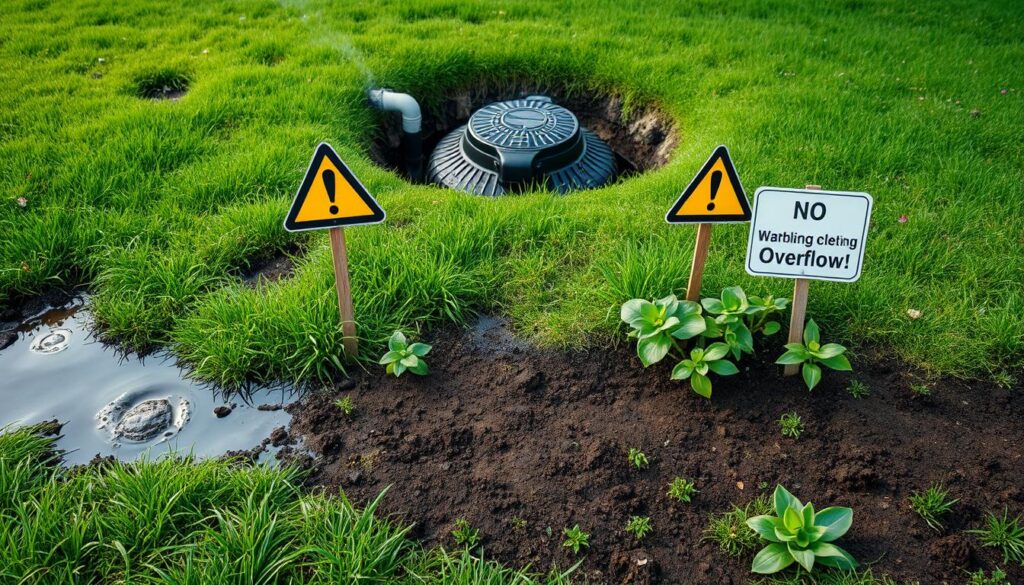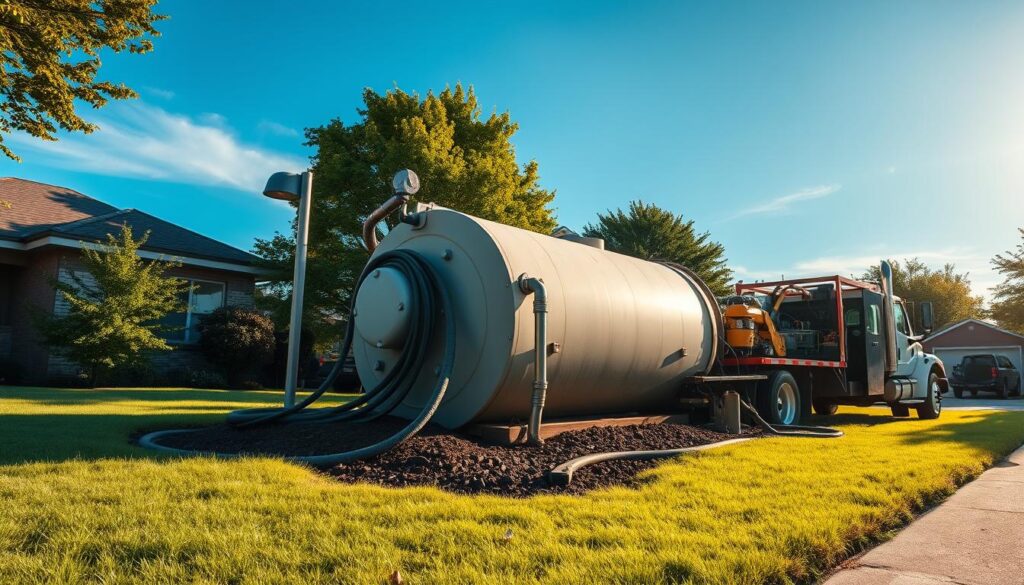“Septic Tank Pumping Near me” , before going deeply . Imagine it’s a sunny Sunday, and the Smith family is having a barbecue. But then, a bad smell comes out, and they see a wet spot near their septic tank. This is a common problem for those with septic systems. It shows how important it is to pump your septic tank regularly and take care of it.
Septic tanks are key for many homes in the U.S. They handle household wastewater but need regular upkeep. The Environmental Protection Agency (EPA) says to pump septic tanks every 3 to 5 years1. But, how often depends on your family size, water use, and tank size1.
If you ignore your septic tank, big problems can happen. A bad septic system can spill untreated wastewater and bad smells. This is dangerous for your family’s health and the environment2. Diseases like dysentery, hepatitis, and typhoid fever can spread through untreated wastewater. So, taking care of your septic system is crucial for everyone’s health2.
To avoid these problems, watch for signs your septic tank needs pumping. Look for slow drains, gurgling sounds, bad smells, and too green grass near the drain field1. If you see these signs, it’s time to get professional help.
Keeping up with septic system maintenance saves money and helps the environment. Bad septic systems can pollute water sources, harming nature2. By taking care of your septic tank, you’re not just fixing your property. You’re also protecting the environment.
If you would like to know more about How to Prevent Expensive Plumbing Disasters: Essential Tips from Experts Near You. Click Here.
Table of Contents
Key Takeaways : “Septic Tank Pumping Near me”
- Septic tanks should be pumped every 3 to 5 years on average
- Regular maintenance prevents system failures and protects water quality
- Signs of needed pumping include slow drains, odors, and lush vegetation
- Neglecting septic care can lead to health hazards and environmental damage
- Factors like household size and water usage affect pumping frequency
- Professional inspection is recommended every 1-3 years
Understanding Septic Tank Systems
Septic tanks are crucial for homes without city sewer systems. They are underground structures that handle household waste safely and effectively.
What is a septic tank? : “Septic Tank Pumping Near me”
A septic tank is a vital part of on-site wastewater treatment. It’s a large, watertight container buried in the yard. It collects and processes sewage from homes.
The tank’s main job is to separate solids from liquids. It starts breaking down organic matter.
How septic tanks function : “Septic Tank Pumping Near me”
Septic tanks work by separating and breaking down waste. When wastewater enters the tank, it forms three layers. Heavier solids sink to the bottom, creating sludge.
Lighter materials like oils and grease float to the top, forming a scum layer. The middle layer is relatively clear water.
Components of a septic system : “Septic Tank Pumping Near me”
A typical septic system has several key parts:
- Tank: The main container where initial separation and treatment occur
- Drain field: An area where treated effluent is released for final filtering
- Distribution pipes: Channels that carry effluent from the tank to the drain field
- Soil: Acts as a natural filter for further wastewater treatment
The design of the septic tank is key for efficient treatment. Most tanks are made of concrete and can last over 40 years with proper care3. Regular maintenance, like pumping every 3-5 years, is vital for good performance4.
This maintenance helps avoid expensive repairs. Replacing a damaged system can cost up to $10,0004.
The Importance of Regular Septic Tank Pumping
Regular septic tank pumping is key for keeping your system running well. It stops failures and protects the environment. Experts say to pump your tank every 3 to 5 years5.
Pumping gets rid of solids and scum in your tank. This makes wastewater treatment better and lowers clog risks. Keeping your septic system in good shape also saves you money on big repairs5.
It also helps protect the environment. It keeps harmful stuff from getting into groundwater or water bodies. This is crucial if your place is near wells or sensitive areas5.
- Prevents system overload
- Reduces odors
- Ensures compliance with local regulations
Regular pumping lets you catch problems early. This saves you money on big repairs later. It’s a smart investment for a healthy and efficient septic system5.
“An ounce of prevention is worth a pound of cure when it comes to septic tanks.”
Big families or places with lots of water use might need pumping more often. It’s important to think about your situation when setting your maintenance schedule5.
Factors Affecting Septic Tank Pumping Frequency
Knowing when to pump your septic tank is key to keeping it running well. Let’s look at what affects how often you need to pump it.
Household Size and Water Usage
The size of your household affects your septic tank’s needs. More people mean more water and waste, so you might need to pump it more often. Saving water can help your drainfield last longer and avoid system problems6.
Tank Size and Capacity : “Septic Tank Pumping Near me”
The size of your septic tank is important too. Bigger tanks hold more waste and need less frequent pumping. Pumping a tank up to 1250 gallons costs between $400 and $7007.
Types of Waste and Septic-Safe Products
What waste goes into your septic system matters a lot. Using products safe for septic systems and avoiding harmful items helps. Using garbage disposals can make your tank fill up faster, needing more frequent emptying7.
| Factor | Impact on Pumping Frequency |
|---|---|
| Household Size | Larger households require more frequent pumping |
| Water Usage | Higher usage leads to more frequent pumping needs |
| Tank Size | Larger tanks need less frequent pumping |
| Waste Types | Non-biodegradable items increase pumping frequency |
Regular checks are vital to find the best pumping schedule for your septic system. Gravity systems need checks every three years, while others need them yearly6. Taking care of these factors helps your septic system last longer and work better.
Signs Your Septic Tank Needs Pumping
Spotting septic system warning signs early can save you from expensive fixes and harm to the environment. It’s crucial to pump your septic tank regularly to keep your plumbing system in good shape8.

- Slow draining fixtures and toilets
- Gurgling sounds in pipes when using plumbing
- Foul odors around your property
- Sewage backup in drains or toilets
- Unusually lush vegetation near the drain field
- Pooling water in the yard
Difficulty flushing toilets or sewage backing up into your home or yard means your septic tank is full8. Gurgling sounds in pipes when using plumbing fixtures often indicate a full septic tank8. Foul sewage odors inside or outside your home could signal sewage leakage from an overflowing tank8.
Drain field issues may show as pools of water on your property, possibly from broken pipes or septic tank leaks8. Also, unusually lush grass growth over the septic tank area can warn of raw sewage leakage89.
The EPA suggests pumping your septic tank every 3 to 5 years to remove sludge buildup9. How often you need to pump depends on tank size, household size, and wastewater volume9. Regular maintenance can reduce system wear and tear, saving money on future repairs and preventing health hazards8.
| Warning Sign | Possible Cause | Action Required |
|---|---|---|
| Slow drainage | Full septic tank | Schedule pumping |
| Sewage odors | Tank leakage | Immediate inspection |
| Pooling water | Drain field issues | Professional assessment |
| Lush vegetation | Nutrient-rich leakage | Tank inspection |
By being alert to these septic system warning signs and acting quickly, you can avoid major sewage backups. This protects your property and the local environment.
Recommended Pumping Intervals
It’s important to have a good septic pumping schedule. The Environmental Protection Agency (EPA) gives general tips. But, your home’s needs can change what’s best for you.
EPA Guidelines : “Septic Tank Pumping Near me”
The EPA says to pump septic tanks every 3 to 5 years. This helps avoid sludge build-up and keeps the system working well10. But, remember, your situation might need a different schedule.
Adjusting Frequency Based on Individual Factors
Your septic pumping schedule should fit your life. Things like family size, tank size, and climate matter. Even having a garbage disposal can affect how often you need to pump11.
For example, a single person might not need to pump for ten years. But, a big family might need to pump every two years12. Businesses usually need to pump or check their tanks every year10.
| Household Size | Recommended Pumping Frequency |
|---|---|
| 1 person | Every 7-10 years |
| 2-3 people | Every 3-5 years |
| 4-5 people | Every 2-3 years |
| 6+ people | Every 1-2 years |
To make a plan that works for you, think about your water use and guests. Regular checks can help find the best pumping schedule for your system.
Remember, pump your tank when sludge is over one-third of the tank11. By following EPA advice and adjusting for your needs, your septic system will work well for a long time.
Septic Tank Pumping Near Me: Finding Local Services
When looking for local septic services, it’s key to find certified companies. Look for septic system experts in your area who offer full services. Many good firms do more than just pump, they also inspect and maintain systems.
Goebel Septic Service, in Western Washington since 1979, suggests pumping every three to five years for best results13. This follows industry advice and avoids expensive fixes. Regular upkeep can save you money and avoid future problems14.

“Septic Tank Pumping Near me”
When picking a service, think about their experience, customer feedback, and costs. For instance, Septic Connection in Gray Court, SC has clear prices and offers free quotes. Some families pay about $750 for a cleaning for six people15.
Choose companies known for quick service, especially for urgent needs. If you smell bad odors or see water near the drain field, act fast14. Don’t delay if you have repeated clogs or backups15.
| Service | Frequency | Benefits |
|---|---|---|
| Septic Tank Pumping | Every 3-5 years | Prevents system failure |
| Inspections | Annually | Identifies potential issues |
| Maintenance | As needed | Extends system lifespan |
By picking a trusted local septic service, you keep your system running well. This avoids expensive fixes and keeps your property value high.
The Septic Tank Pumping Process
Knowing how septic pumping works is key for homeowners with septic systems. It involves removing waste and keeping your system running well.
What to Expect During Pumping : “Septic Tank Pumping Near me”
Experts start by finding your tank and opening it. They use a vacuum truck to take out waste like solids, sludge, and scum. This cleaning keeps your tank working right and stops blockages16.
They also check the tank’s state, clean baffles, and look at filters. This ensures your wastewater is treated well16.
Professional vs. DIY Pumping : “Septic Tank Pumping Near me”
While DIY septic care might seem appealing, it’s best to get professional help. Most homes need septic pumping every 2 to 4 years, especially big families17. This service costs about $750 for a 1500-gallon tank and can be set up quickly17.
| Aspect | Professional Services | DIY Maintenance |
|---|---|---|
| Safety | Trained professionals handle hazardous waste | Safety risks for untrained individuals |
| Equipment | Specialized vacuum trucks and tools | Limited access to proper equipment |
| Thoroughness | Complete cleaning and inspection | Potentially incomplete cleaning |
| Waste Disposal | Proper disposal methods ensured | Challenges in proper waste management |
Regular professional pumping stops early failures and expensive fixes. Skipping this can cost a lot, up to tens of thousands of dollars16. Choosing pros means your tank gets a full clean, waste is handled right, and problems are caught early.
Maintaining Your Septic System Between Pumpings
Keeping your septic system in good shape is key to its long life and efficiency. Regular upkeep stops expensive fixes and keeps it running well. Here are some important steps to care for your septic system between pumpings.

Conserving water is vital for your septic system’s health. Fix leaks fast and spread out water use to avoid overloading. Using low-flow fixtures and watching your water use can lessen the load on your tank.
It’s also crucial to dispose of waste correctly. Use products safe for septic systems and avoid flushing things that won’t break down. Teach everyone in your home what can and can’t go down the drain to avoid clogs and damage.
- Only flush toilet paper and human waste
- Dispose of cooking grease in the trash, not down the sink
- Use garbage disposals sparingly
Keep your drain field in check by avoiding heavy traffic and planting only grass on it. This area is key for treating wastewater, so keeping it up is vital for your system’s health.
Regular checks can spot small problems before they get big. Think about getting a pro to inspect your system every three years to make sure it’s working right18.
By sticking to these care tips, you can make your septic system last longer and avoid expensive fixes. Remember, most septic tanks fail after 20 to 30 years, even with regular pumping, so proper care is essential for a longer life19.
Consequences of Neglecting Septic Tank Pumping
Ignoring septic tank pumping can cause big problems. Experts say to pump every three to five years to stay safe2021. Let’s look at what happens if you skip this important task.
Environmental Impacts : “Septic Tank Pumping Near me”
Not pumping septic tanks can cause them to overflow. This spills untreated sewage into the environment. It contaminates soil, groundwater, and surface water21.
This pollution harms local ecosystems and wildlife.
Health Hazards : “Septic Tank Pumping Near me”
Ignoring septic systems can be very dangerous. Contaminated water can lead to many illnesses. These include stomach, skin, lung, eye, and ear infections21.
Diseases like Hepatitis A, Salmonella, and E. coli can also spread because of poor maintenance21.
Property Damage and Repair Costs
Septic system failure can be very expensive. Sewage backups can damage your home and property. Signs include slow drains, gurgling pipes, and very green grass over the drain field20.
Regular pumping can prevent these problems and make your system last longer20.
| Consequence | Impact |
|---|---|
| Environmental | Groundwater contamination, soil pollution |
| Health | Gastrointestinal illnesses, skin infections |
| Property | Sewage backups, system failure, costly repairs |
Don’t risk septic system failure, groundwater contamination, or expensive repairs. Regular pumping is crucial to avoid these serious issues. Keep your health, property, and the environment safe by taking care of your septic system.
Conclusion : “Septic Tank Pumping Near me”
Regular septic tank pumping is key for good homeownership and caring for the environment. By keeping up with maintenance and watching for signs, you can keep your septic system running well. This helps avoid expensive fixes22.
Experts say you should pump your septic tank every three to five years. This keeps it working right, stops overflows, and cuts down on sludge. It also makes your system last longer23. Don’t think that septic systems don’t need regular checks, even if it’s not always obvious22.
When picking a septic service, look at their license, reputation, and how clear they are about prices22. Good services help both homes and businesses. They’re ready for emergencies or big backups2223.
By taking care of your septic system, you protect your home and the planet. Regular upkeep stops problems and helps the environment. It makes your community a healthier place for the future. By following the details above, you will be sure in the right direction to choose what suit you when it comes to search for “Septic Tank Pumping Near me”.








Can you be more specific about the content of your article? After reading it, I still have some doubts. Hope you can help me.
Your article helped me a lot, is there any more related content? Thanks!